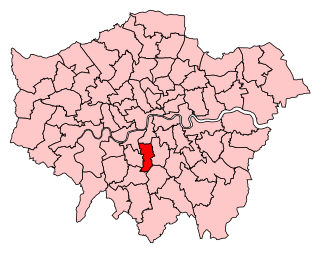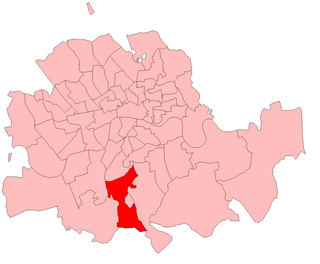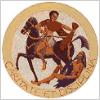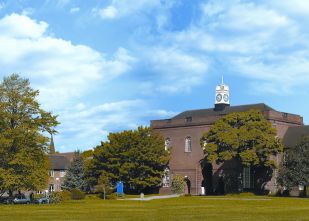
Tulse Hill is a district in the London Borough of Lambeth in South London that sits on Brockwell Park. It is approximately five miles from Charing Cross and is bordered by Brixton, Dulwich, Herne Hill, Streatham and West Norwood.

The Inner London Education Authority (ILEA) was the local education authority for the City of London and the 12 Inner London boroughs from 1965 until its abolition in 1990. From 1965 to 1986 it was an ad hoc committee of the Greater London Council; on 1 April 1986 it was reconstituted as a directly elected body corporate.
Sir Ernest Ashley Bramall was a British Labour Party politician, Member of Parliament for Bexley from 1946 to 1950 and Leader of the Inner London Education Authority (ILEA) for 11 years. He married twice – his first wife, Margaret, led the National Council for One Parent Families and looked after their two children.
(Peter) Neil Fletcher was a Labour politician and the last Leader of the Inner London Education Authority before its abolition.

Brinley Howard Davies, Baron Davies of Brixton, known as Bryn Davies, is a British trade unionist, actuary and politician who was Leader of the Inner London Education Authority in the early 1980s.
Frances Morrell was a British Labour politician who led the Inner London Education Authority from 1983 until 1987.

Streatham was a constituency represented in the House of Commons of the UK Parliament.

Lambeth London Borough Council is elected every four years.
Cllr Nicholas Jerome Bennett JP is a British politician and a former Mayor of the London Borough of Bromley. A member of the Conservative Party, he served as a member of parliament (MP) from 1987 to 1992 representing the constituency of Pembrokeshire, and was a Parliamentary Under-Secretary of State at the Welsh Office from 1990 to 1992. In that role he had responsibility for the Welsh Health Service, Social Services, Housing and Local Government, Water and Sport.
Sir William Jeremy Masefield Shelton was a Conservative Party politician in the United Kingdom. He was Member of Parliament for Clapham from 1970 to February 1974, then for Streatham from February 1974 until he lost the seat to Labour Party candidate Keith Hill in 1992.

Norwood was a parliamentary constituency in south London which returned one Member of Parliament (MP) to the House of Commons of the Parliament of the United Kingdom by the first past the post system.

Tulse Hill School was a large comprehensive school for boys in Upper Tulse Hill, in the London Borough of Lambeth, England. The school building had eight floors and served almost two thousand pupils. It opened in 1956 and closed in 1990. Notable alumni include Ken Livingstone, the former London Mayor, and poet Linton Kwesi Johnson.
Strand School was a boys' grammar school in the Tulse Hill area of South London. It moved there in 1913 from its original location at King's College in London's Strand.

St Martin-in-the-Fields High School for Girls was one of the oldest schools for girls in Britain. It was established in 1699 as a charitable enterprise by the parish of St Martin-in-the-Fields. Its popularity and growth led to its relocation in 1928 on a larger site in Tulse Hill, in the South London borough of Lambeth, England. For most of its history it was a grammar school, but at its closure in 2024 it was a secondary school with academy status.
Elm Wood School is a primary school based at the southern end of the inner London Borough of Lambeth. The school has gone through a number of changes since its establishment at the beginning of the twentieth century reflecting the changing policies of local and national governing authorities as well as the changing nature of the community it serves.
The Elmgreen School is a coeducational secondary school and sixth form located in the West Norwood area of the London Borough of Lambeth, England. It was the first Parent Promoted secondary school to be created in the UK under the School Standards and Framework Act 1998.

A direct grant grammar school was a type of selective secondary school in the United Kingdom that existed between 1945 and 1976. One quarter of the places in these schools were directly funded by central government, while the remainder attracted fees, some paid by a Local Education Authority and some by the pupils' parents or guardians. On average, the schools received just over half of their income from the state.

Paul Stephen Farmer was a British educationalist who developed the use of pop music in school music education in the 1970s, and is reputed to be the first to devise a public examination in the UK exclusively in pop music. He wrote several music education books and became a London comprehensive school head teacher at the age of 33.
Queen Anne Grammar School for Girls was a single-sex state grammar school in the city of York, England. It began in 1906 as the Municipal Secondary School for Girls and was based in Brook Street. At the end of 1909 the pupils were transferred to a new 5+1⁄2-acre site in Clifton. The school was officially opened on 18 January 1910 by the Archbishop of York, Cosmo Gordon Lang.
The Schools Action Union (SAU) was a British students' union for school children active in the early 1970s. It formed at the Free School Campaign (FSC) conference of January 1969 from attendees who did not want to follow the non-political path chosen by the FSC. The SAU set out a list of aims that included the abolition of corporal punishment in schools and the transition of all schools to become comprehensive and co-educational. A number of journals were published and the union, which became dominated by Maoists, organised significant school strikes in May 1972. The SAU dissolved in 1974 but the abolition campaign continued and saw corporal punishment banned nationally in all state schools in 1986; though non-comprehensive and single sex schools continue.










